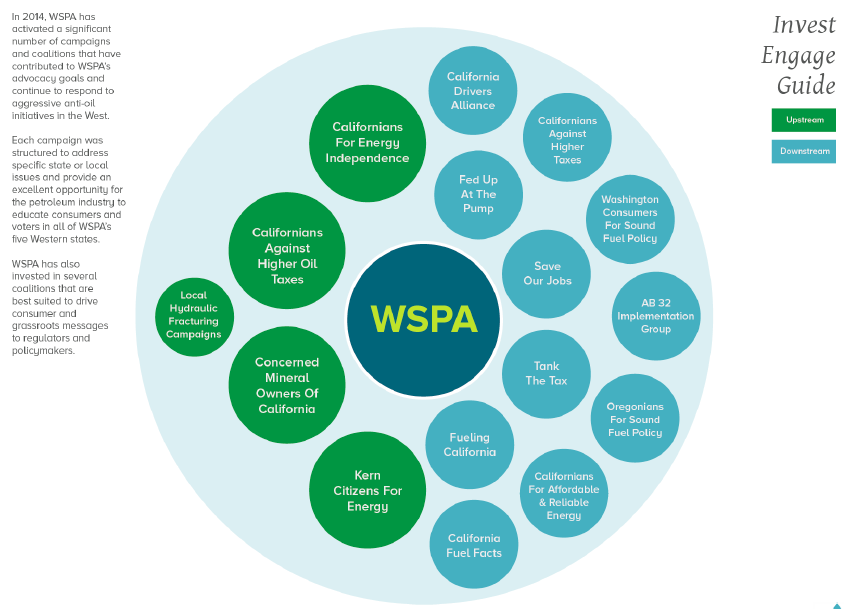
It's no surprise that the oil industry is fighting California's cap-and-trade program. But it is enlightening to see the strategy laid out in a leaked PowerPoint presentation [PDF].
Last week, Brad Wieners at Bloomberg Businessweek leaked a presentation put together by the Western States Petroleum Association (WSPA), an oil industry lobby firm that operates in California. In the presentation slides, WSPA details its strategy to oppose regulatory efforts in California, Oregon, and Washington to combat climate change, including California's Global Warming Solutions Act (A.B. 32), low carbon fuel standards, and the cap-and-trade system.
![Examples of oil industry astroturf campaigns in the states of Washington, Oregon, and California. Images via WSPA powerpoint [PDF]](https://lede-admin.la.streetsblog.org/wp-content/uploads/sites/50/2014/12/astroturfcollage.jpg?w=710)
The main strategy is what Wieners calls an “astroturf campaign”:
“Groups with names such as Oregon Climate Change Campaign, Washington Consumers for Sound Fuel Policy, and AB 32 Implementation Group are made to look and sound like grassroots citizen-activists while promoting oil industry priorities and actually working against the implementation of AB 32.”
One of those groups put together the “Stop the Hidden Gas Tax!” campaign, which tried to convince California consumers to protest against rising gas prices that will supposedly result from the fuel industry coming under cap-and-trade regulation in January. The campaign didn't get much traction, perhaps because gas prices are falling, or perhaps because, as Tim O'Connor of the Environmental Defense Fund points out, California voters have consistently supported clean energy alternatives.
O'Connor told Business Week:
It’s eye-opening to see the lengths [the WSPA] has gone to push back rather than move forward. I don’t think anybody knew how cross-jurisdictional, cross-border, and extensive their investment is in creating a false consumer backlash against [climate legislation].
WSPA spokesperson Tupper Hull responded in the article:
We did not oppose AB 32 when it passed. We believe it’s good to have the reduction of greenhouse gases as a goal. We support that goal. [But] hundreds of pages of regulations have been added to what had been a page-and-a-half document, and we do object to many of the additions.”
However, WSPA took part in the formulation of those regulations.
A.B. 32, and its cap-and-trade regulations that charges industries money for the pollution they emit, is groundbreaking and frightening to big oil, as evidenced by WSPA's presentation. It is just beginning to produce major funding streams for all kinds of sustainable programs, from affordable housing to transit to high speed rail, and the rest of the nation, and the world, are watching to see how well it succeeds. A.B. 32 could spawn climate change legislation elsewhere, equally noxious to the oil companies' polluting habits, so no wonder they are attacking it every way they can.






